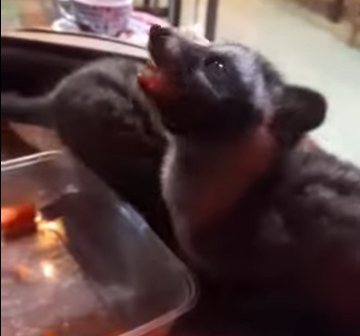
Important Note on Kopi Luwak Production
At The Poop Coffee, we want to be clear:
we do not endorse, promote, or sell kopi luwak from farmed or caged animals.
We believe that truly authentic kopi luwak can only come from wild civets living freely in their natural habitat.
However, as part of our commitment to education and transparency in the coffee industry, we're sharing insights from an experienced breeder who has worked with these animals for over a decade.
This information is provided purely for educational purposes, to help coffee enthusiasts understand these remarkable creatures and the complexities surrounding kopi luwak production.
The Asian Palm Civet: Understanding These Remarkable Animals
The Asian palm civet (known in Indonesia as the 'luwak') has become globally recognised through its association with kopi luwak coffee.
As specialists in coffee education, we believe that understanding these animals is crucial for meaningful discussions about ethical coffee production and wildlife conservation.
Natural Selection Process
In their natural habitat, Asian palm civets demonstrate remarkable selectivity in choosing coffee cherries.
These discerning animals naturally identify and consume only the ripest, highest-quality fruit.
Their selective behaviour isn't merely preference - it's an instinctive ability to recognise optimal ripeness and quality.
When presented with coffee cherries, they'll only consume those that meet their exacting standards, refusing fruit that's overripe or has been sitting too long after harvesting.
This selection process is notably time-sensitive.
The cherries must be fresh from harvesting, as the civets will reject fruit that's been stored, even briefly.
This natural quality control process is fundamental to the distinctive characteristics of kopi luwak coffee.
Diet and Natural Feeding Patterns
While coffee cherries are commonly associated with these animals,
Asian palm civets maintain a diverse diet essential for their health and well-being.
According to our source, their regular diet includes:
- Fresh bananas
- Papaya
- Chicken and eggs for protein
- Carefully selected coffee cherries (which should only comprise a small part of their diet)
In farming situations, exposure to coffee cherries is typically limited to three times weekly to prevent dietary stress.
However, in their natural habitat, civets have complete freedom to choose their diet according to their instincts and seasonal availability.
Breeding and Behavioural Characteristics
Our source's decade-long experience with civet breeding has revealed fascinating aspects of their nature.
The breeding season typically occurs between January and March, followed by approximately a year-long gestation period.
Most females give birth to two or three cubs, though successful breeding requires careful attention to environmental conditions, as these animals are particularly sensitive to stress during pregnancy.
One of the most interesting aspects of civet behaviour is their scent-marking characteristics.
They produce distinct aromas reminiscent of pandan leaves when marking territory or experiencing stress, and can emit a popcorn-like scent under certain conditions - a unique trait that demonstrates their complex biological processes.
Conservation and Ethical Considerations
While our source maintains approximately 24 civets within a three-hectare property, we at The Poop Coffee advocate for the protection of wild civet populations and their natural habitats.
The information about farmed conditions - including details about living spaces, roaming areas, and production yields - is shared to provide context and understanding about these animals' needs and behaviours, not to promote farming practices.
Understanding Kopi Luwak Production
Although farms may yield between 100 to 300 kilograms of coffee per hectare each season, only a small portion becomes kopi luwak.
This limited production reflects the natural feeding patterns and selective behaviour of civets.
However, we believe that true kopi luwak should only come from wild civets living in their natural ecosystem.
Educational Purpose and Future Considerations
Understanding these remarkable animals is crucial for making informed decisions about coffee consumption and wildlife conservation.
The premium traditionally associated with kopi luwak has led to concerning farming practices, which is why we believe education about these animals is vital for promoting ethical choices in the coffee industry.
Our Commitment
At The Poop Coffee, we remain committed to ethical coffee production and wildlife conservation.
While we appreciate the insights provided by experienced breeders, we advocate for the protection of wild civet populations and their natural habitats.
We believe that sharing this information contributes to a better understanding of these remarkable animals and promotes more informed discussions about ethical coffee production.
